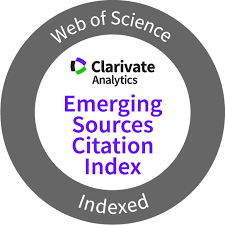Efectos del Covid-19 en el sector emprendedor costarricense / Effects of Covid-19 in the Costa Rican entrepreneurial sector
DOI:
https://doi.org/10.5783/revrrpp.v11i22.724Keywords:
Relaciones Públicas, Administración de Negocios, emprendimiento, COVID-19, desempleo, e-comerce, desarrollo económico y socialAbstract
Este estudio buscó investigar el impacto, las respuestas y demandas de apoyo en relación con recursos humanos, económicos, tecnológicos y estrategias de Relaciones Públicas centradas en comunicación digital como motor de comercialización de productos y servicios, necesarias ante la crisis provocada por el Covid-19. Los resultados mostraron información de un colectivo de emprendedores procedentes de bases de datos de aliados estratégicos al equipo de investigación, tales como cámaras gremiales y colegios profesionales además de empleadores de la Universidad Latina de Costa Rica, que de forma voluntaria dieron respuesta al instrumento digital de 36 preguntas validado a través del criterio experto y un piloto de prueba, se excluyeron aquellas empresas o emprendimientos que respondieron entre el 3 abril y el 7 de mayo del 2020.Se obtuvieron 138 respuestas, de emprendimientos localizados principalmente en la provincia de San José distribuidos de la siguiente manera, 50%, 84,7% de micro y pequeñas empresas y 9,3% de medianas y grandes, ubicadas en su mayoría en una etapa de desarrollo, el resto de los emprendimientos participantes se ubicaron en las etapas de inicio y madurez en su mayoría y cubren una amplia gama de sectores de actividad. El mayor número de emprendedores participantes se encontraron en el rango de edad de 30 a 40 años 38%. Finalmente, se constata que los efectos directos e indirectos del Covid19 en el sector emprendedor de la economía costarricense provocaron 55,7% de recortes en la jornada laboral como práctica en sus negocios para enfrentar la crisis y una disminución en 67% en el precio de sus productos o servicios, experimentando una transformación en la gestión y desarrollo de estrategias de Relaciones Públicas centradas principalmente digitales que hasta antes de esta fecha no eran habituales.
Palabras clave: Relaciones Públicas, emprendimiento, COVID-19, desempleo, e-comerce, desarrollo económico y social
Abstract
This study seeks to investigate the impact, responses and demands for support, in the face of the crisis caused by Covid 19, by entrepreneurs and organizations in the economic sectors, as well as the strategies considered to have the greatest impact on their business and that could consider necessary. The study took information from a survey that obtained a total of 138 responses, mainly located in the province of San José (50%), more than half (84.7%) include micro and small businesses and a (9, 3%) medium and large companies mostly located in a development stage in which the company achieves a degree of positioning in the market that guarantees its sustainability over time, the rest are located in the beginning and maturity stages mostly, they cover a wide range of sectors of activity. The largest number of participating entrepreneurs was found in the age range of 30 to 40 years (38%). Thus, it is found that the direct and indirect effects of covid 19 in the entrepreneurial sector of various sectors of the Costa Rican economy caused (55.7%) cuts in working hours as a practice in their businesses to face the crisis and a decrease in (67%) in the price of their products or services, experiencing a transformation in the management of business models that until before this date were usual. It is evident that the effects of the pandemic caused by COVID-19 had a strong impact on the Costa Rican productive sector, and the need for support from the businesspersons who have been affected is evident.
Furthermore, for a country of 5.5 million inhabitants, the pandemic leaves more than 400 thousand people unemployed (16.4% + 11.1% underemployed), that is, 92 thousand more than before COVID 19. The worst hit groups are those of women and youth, leading them and the other unemployed to migrate to informality. 1,455 micro (1-5 employees), small (6-30 employees) and medium (31-100) closed. These companies have little chance of reopening, having to increase the figures of informality and in many cases, 2% of GDP in smuggling and illicit trade.
The Costa Rican government must work to support new ventures that allow the insertion of new businesses in the formal sector, leading innovation, and competitive proposals to face new challenges.
Access to soft loans, improvements in social security rates and differentiated fees for taxation should be part of the solutions. In addition, ensure that the minimum contributory rate of social security is modified for the payment for part-time work, so that the same companies hire personnel based on the hours worked and not for a single rate.
It should be considered that Costa Rica is already part of the OCDE and that is going through a historic electoral process (26 presidential candidates), to put this problem in the sights of the candidates. The joint work between private sector, government, financial and educational institutions is a must. Costa Rica is walking at the edge of falling into an economic default and helping these initiatives could be a magic recipe for the economy.
Keywords: Public Relations, entrepreneurship, COVID-19, unemployment, e-commerce, economic and social development
Downloads
References
ASOCIACIÓN OBSERVATORIO DEL EMPRENDIMIENTO DE ESPAÑA (2020, octubre). Situación del emprendimiento en España ante la crisis del COVID-19 Análisis y recomendaciones, nº. 1. Recuperado el 7 de octubre de 2021 de https://cutt.ly/0Y7u0Xh
BANCO MUNDIAL (2020, mayo 11). Costa Rica: Panorama general. Recuperado 11 de mayo de 2020, de https://www.bancomundial.org/es/country/costarica/overview
BRENES BONILLA, L., BERMÚDEZ MESÉN, L. y CAMPOS VARGAS, C.A. (2015). Relación de la densidad empresarial con la pobreza, la educación superior y la conectividad tecnológica, en las provincias y cantones de Costa Rica. Cuadernos de Investigación UNED,7 (2), 105-117.
CASTILLO-ESPARCIA, A. (2010). Introducción a las Relaciones Públicas. Málaga: Instituto de Investigación en Relaciones Públicas.
COLOMINA CLIMENT, E. y YÁÑEZ MUÑOZ, L. (2014). Herramientas para el análisis y validación de ideas de negocio (Kit de herramientas para el análisis y validación de ideas de negocios). Revista Global de Negocios, 2(4),105-123
EL MUNDO CR (2019, 9 octubre). Costa Rica cae 7 puestos en el Índice de Competitividad Global. El Mundo CR. Recuperado el 11 de mayo de 2020 de https://cutt.ly/xY7iw1d
ESTADO DE LA NACIÓN (2019, octubre 11). Programa del estado de la nación. Recuperado 11 de mayo de 2020, de https://cutt.ly/9Y7uNEg
ESTADO DE LA NACIÓN (2020, 5 febrero). Informes Programa Estado Nación. Recuperado el 22 de octubre de 2021 de https://estadonacion.or.cr/informes/
GRUNIG, J. E. y HUNT, T. (2001). Dirección de relaciones públicas. Barcelona: Gestión 2000.
HANAFIAH, M.H., YOUSAF, S.U. Y USMAN, B. (2017). The influence of psychological capital on the growth intentions of entrepreneurs: A study on Malaysian SME entrepreneurs. Business and Economic Horizons, 13(5), 556-569. https://doi.org/10.15208/beh.2017.38
INSTITUTO NACIONAL DE ESTADÍSTICA Y CENSO (2020, 23 febrero). Estadísticas Instituto Nacional de Estadistica y Censos. Costa Rica: INEC. Recuperado el 21 de mayo de 2021 de https://www.inec.cr/estadisticas
KANTIS, H. y ANLLELI, P. (2020, 5 septiembre). Los ecosistemas de emprendimiento de América Latina y el Caribe frente al COVID 19. Costa Rica: Banco Interamericano de Desarrollo. Recuperado el 18 de septiembre de 2021 de https://cutt.ly/oY7iJdM
LUNDSTROM, A. and STEVENSON, L.A. (2005) Política de emprendimiento: definiciones, fundamentos y marco. En Política de emprendimiento: teoría y práctica. Estudios internacionales en espíritu empresarial, vol 9. Boston: Springer.. https://doi.org/10.1007/0-387-24202-3_2
LUNDSTRÖM, A., y STEVENSON, L. (2005). Entrepreneurship policy: Theory and practice. EE.UU.: Springers Publishers.
MAYORGA LÓPEZ, G. (2020, 3 abril). HackCovid19CR: Mä¡s de 400 emprendedores iniciaron el desarrollo de Universidad de Costa Rica. Recuperado el 23 de marzo de 2021 de https://cutt.ly/1Y7iVWD
MESÉN, R. (2019, 5 diciembre). La clave de la reactivación comercial es la formalidad en el empleo. Rumbo Económico.
MINISTERIO DE ECONOMÍA, INDUSTRIA Y COMERCIO. (2017, 2 abril). Aumentó la cantidad de microempresas en el país. Recuperado el 21 de septiembre de 2021 de https://www.meic.go.cr/meic/comunicado/940/aumento-la-cantidad-de-microempresas-en-el-pais.php
MOLINA, S.A.P. y ACEVEDO, M.C. (2013). Caracterización del comportamiento emprendedor para los estudiantes de administración de la Universidad Nacional. Revista EAN, 71(22). https://doi.org/10.21158/01208160.n71.2011.549
NOSOTROS – OBCI: CÁMARA DE COMERCIO COSTA RICA (2017, 12 octubre). Observatorio del Comercio Ilícito. Recuperado el 23 de agosto de 2021 de https://cutt.ly/qY7oPsA
OGLIASTRI, E. (2014). Editorial. Academia Revista Latinoamericana de Administración, 27(3), 318-323. https://doi.org/10.1108/arla-09-2014-0142
OLMOS, J. (2007). Tu Potencial Emprendedor (1.a ed., Vol. 20). Reino Unido: Pearson Educación.
PAQUETTE, M., SOMMERFELD, E.J., y KENT, M.L. (2015). Do the ends justify the means? Dialogue, development communication, and deontological ethics. Public Relations Review, 41(1), 30-39. http://dx.doi.org/10.1016/j.pubrev.2014.10.008
PEÑA, C. (2017, 12 junio). ¿Costa Rica Emprende? La República. https://www.larepublica.net/noticia/costa-rica-emprende
PERALTA QUESADA, L. (2019). El sistema de innovación para las mipymes costarricenses: hacia un modelo de articulación. México: CEPAL. Recuperado 3 de febrero de 2020, de https://repositorio.cepal.org/bitstream/handle/11362/44607/1/S1900362_es.pdf
PIECZKA, M. (2011). Public relations as dialogic expertise? Journal of communication management, 15(2), 108-124. http://dx.doi.org/10.1108/13632541111126346
QUINTERO, Y.R. (2014). Comunicación Corporativa, Relaciones Públicas y logística en la Dinámica Organizacional. Encuentros, 12(1), 47-58.
RODRÍGUEZ MORENO, D.C. (2016). Emprendimiento sostenible, significado y dimensiones. Revista Katharsis, 21 (3), 449. https://doi.org/10.25057/25005731.775
SÁENZ-SEGURA, F. (2020, 14 mayo). Medidas de política económica para Costa Rica ante la crisis mundial del COVID-19. Costa Rica: Repositorio Universidad Nacional de Costa Rica. https://repositorio.una.ac.cr/handle/11056/17334
SMITH, R. (2002). Innovation studies in the 21st century: Questions from a user's perspective. Technological Forecasting and Social Change, 69(9), 861-883.
TAYLOR & KENT (2014). Dialogic Engagement: Clarifying Foundational Concepts, Journal of Public Relations Research, 26 (5), 384-398. https://doi.org/10.1080/1062726X.2014.956106
TORRES, R. (2015). Estímulo a la creatividad y emprendimiento joven para la innovación social en un contexto global. Revista de Estudios de Juventud, 109: 127-145. Recuperado el 21 de noviembre de https://issuu.com/injuve/docs/revista_estudios_juventud_109
VÁSQUEZ, C. (2017). Educación para el emprendimiento en la universidad. Estudios de la Gestión. Revista Internacional de Administración, 121-147. https://doi.org/10.32719/25506641.2017.2.5
VILLA, A., VALLS, N., MARTINEZ, S. & HERNANDO, A. (1999, 4 noviembre). Emprendimiento social juvenil. 18 buenas prácticas. Barcelona: Fundación Bertelsmann. Recuperado el 22 de octubre de 2021 de http://observatoritercersector.org/pdf/publicacions/2009-07_Emprendimiento_Social_Juvenil.pdf.
WIKLUND, J., DAVIDSSON, P., AUDRETSCH, D.B., & KARLSSON, C. (2011). The future of entrepreneurship research. Entrepreneurship Theory and Practice,35 (1), 1-9. https://doi.org/10.1111%2Fj.1540-6520.2010.00420.x
Downloads
Published
How to Cite
Issue
Section
License
Authors publishing in this journal agree to the following terms:
a. Authors retain copyright and grant the journal the right to be the first publication of the work as licensed under a Creative Commons Attribution License that allows others to share the work with an acknowledgement of authorship of the work and initial publication in this journal.
b. Authors may separately enter into additional arrangements for non-exclusive distribution of the version of the work published in the journal (e.g., placing it in an institutional repository or publishing it in a book), with an acknowledgement of initial publication in this journal.
c. Authors are allowed and encouraged to disseminate their work electronically (e.g. in institutional repositories or on their own website) before and during the submission process, as it can lead to productive exchanges, as well as earlier and higher citation of published work (see The Effect of Open Access).




